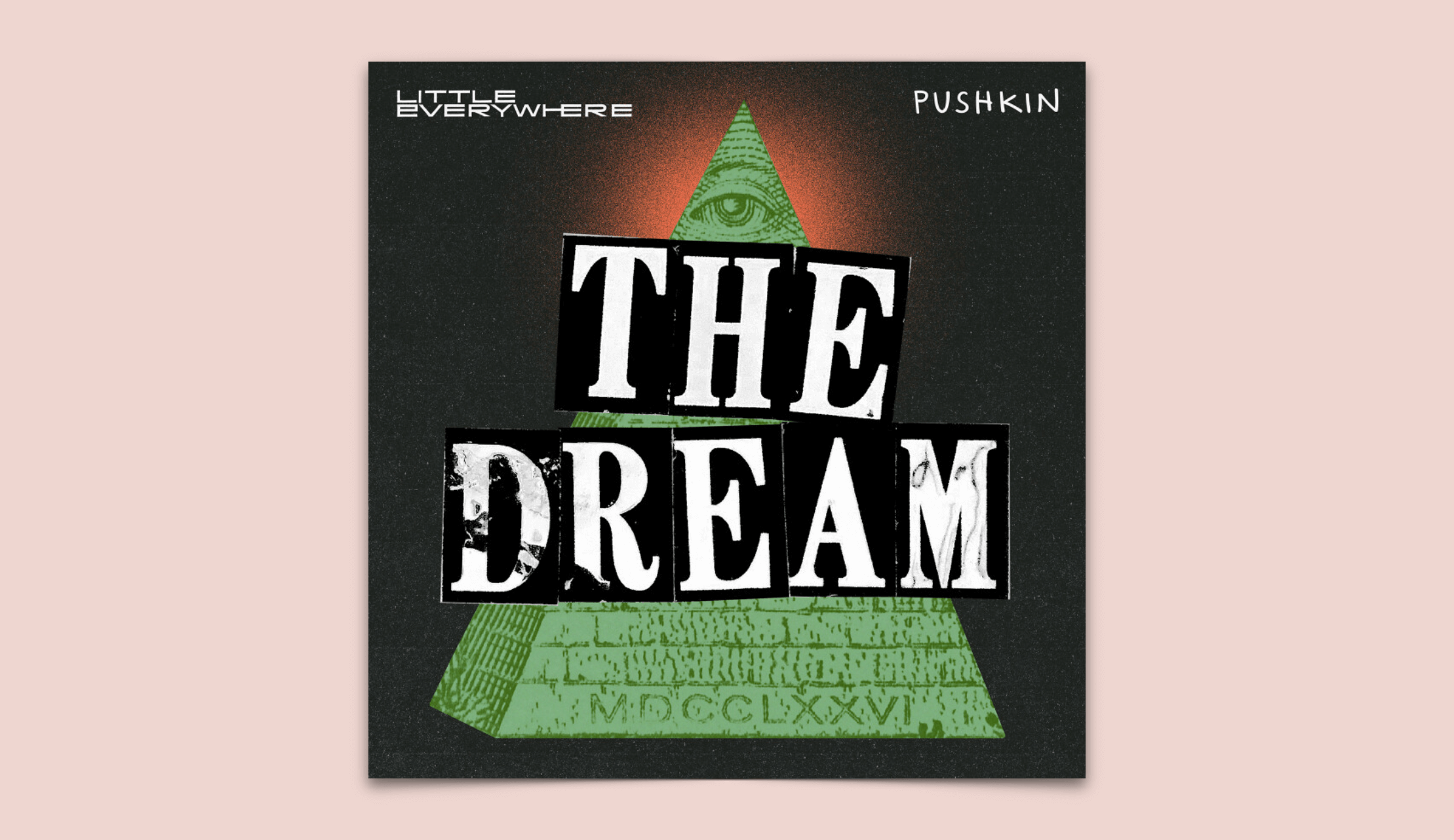From meditation courses to diet plans, we spend billions every year chasing the “best” version of ourselves. Self-development coaches are cashing in on this boom and have made it their mission to help us on our journey — if you have the money. As Jane Marie observes in episode one of The Dream’s new season, it’s hard to tell whether these “gurus” are more interested in controlling our hearts and minds, or controlling our bank accounts. After two previous seasons exploring multi-level marketing and the wellness industry, the hit podcast from Pushkin Industries and Little Everywhere is back, this time turning its ire on the unregulated world of self-help. So put down your green juice, because we’re about to be taken on a brutal hike through the desert, into the misery of a coaching call, and to the deepest recesses of the unconscious mind. Think you can handle it?
Season one of The Dream was a compelling exposé of the murky world of multi-level marketing (MLM). It took listeners from the heartland of the Midwest all the way to the Oval Office. Hosted by Peabody and Emmy Award-winning journalist Jane Marie, The Dream‘s debut was ahead of the curve. By challenging the political power and manipulative techniques wielded by MLM companies — some little more than pyramid schemes with bows on — The Dream pre-empted documentaries like LuLaRich and countless YouTube videos commentating on why MLMs are not the once-in-a-lifetime opportunity they pretend to be.
In its second season, the show shifted attention to the rise of “wellness” — that strange world inhabited by both Gwyneth Paltrow and your favorite basketball player. Though less polished than the first, it reflected a growing skepticism around the industry of self-care, a whole year before the start of the popular anti-wellness podcast Maintenance Phase. This is why the latest season, devoted to investigating the self-help industry, can feel a bit late to the scene. If Books Could Kill has been around for a while. And for several years now, we’ve been reading op-eds and watching YouTube videos that problematize self-help. At times, it feels this season is employing other people’s work to do most of the heavy lifting, with Marie just putting it in order.
Want to receive our latest podcast reviews and episode recommendations in your inbox? Sign up here for our weekly newsletter.
A notable difference between the show’s three seasons is the degree to which Marie enters the narrative. Her narrative choices have evolved beyond those of the New Journalists by using her personal experiences as a subplot to amplify her main themes. Many podcasts have employed this technique recently, including Dolly Parton’s America and Anything for Selena. One of the major criticisms of The Trojan Horse Affair took aim at the fact that the reporters didn’t merely grapple with their own bias but questioned the entire notion of journalistic neutrality. What should we call this? Hyper journalism? Navel-gaze journalism? While this approach can be refreshing — an attempt to humanize a topic — it can often feel like a conciliatory attempt to make everything “relatable.”
When, in episode two, Marie confesses that she hasn’t felt like herself since before the pandemic — a loss of self-worth that has led to the breakdown of her relationship — it is clearly the most relatable part of the season. But by telling us about her physical pain and lingering depression, Marie is doing more than making the show easier to empathize with. She is giving us a more complex way of engaging with critique. There is something a bit culty about all of these industries, a thread that The Dream never fails to pick apart. But while it’s easy to “debunk” something, as Maintenance Phase attempts without end, Jane Marie does something more ambitious. She concedes that physical and mental well-being does not exist in isolation. To be happy, we cannot simply think of ourselves as individuals. So, while she blasts new-age gurus for being obsessed with the self, she is also highlighting the fact that “improving yourself” — whether as a friend, colleague, or partner — is a vital part of participating in a community. So maybe, she concedes, there might be something to this “self-development” stuff after all. Rather than debunking, she decodes, self-examines, and offers solutions.
Perhaps the most fundamental question at the heart of this podcast is the hardest to answer: is the American Dream actually a toxic delusion? Marie’s conclusion is complicated. Of course the self-help industry is full of charlatans, she says. Of course it’s a capitalistic system that ignores systems of oppression, insisting good fortune to be evidence of hard work and worthiness. At the same time, we can’t ignore that health, behavior, and happiness don’t exist in a bubble. So, while it might not be ahead of the game in asking these questions, The Dream turns relatability on its head, offering another engaging, provocative, and thoughtful season that leaves us already anticipating the next.
¤
Alice Florence Orr is a staff writer and assistant editor for Podcast Review. She is based in Edinburgh. You can connect with her on Twitter or read her work on aliceflorenceorr.com

